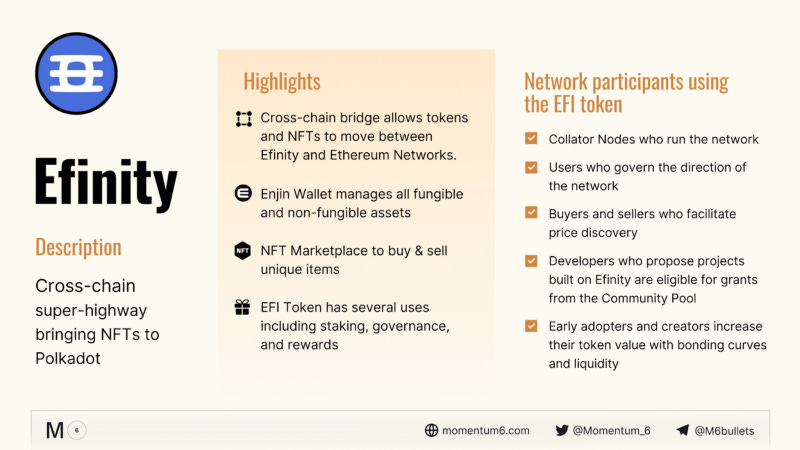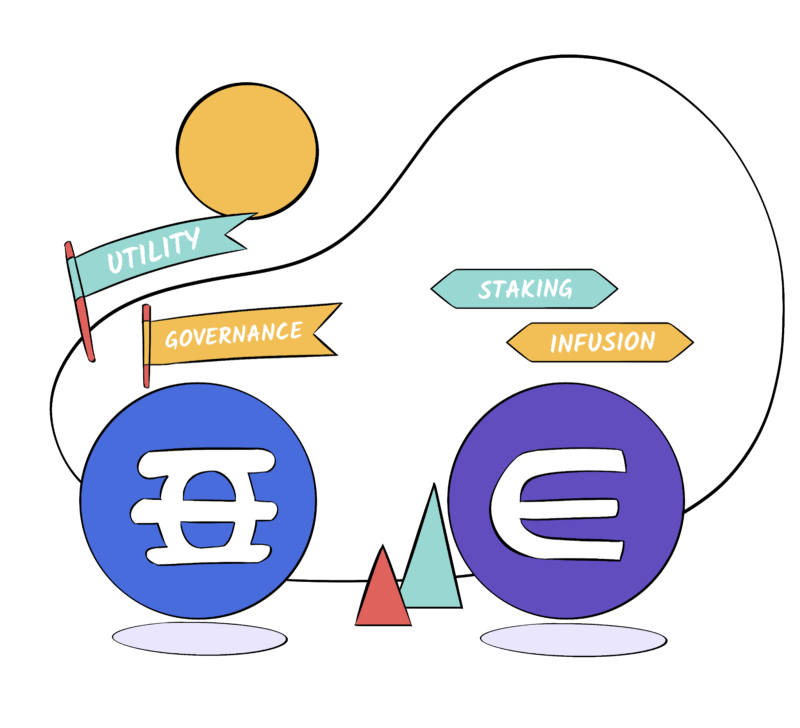Polkadot Parachain Spotlight: Efinity
Efinity is a cross-chain token highway that makes NFTs common and as simple to use as smartphones.
Efinity is a next-generation blockchain for digital assets created on Polkadot. Enjin, the developer behind Efinity, is creating a mainstream, developer-friendly, and modern NFT experience. Efinity is a cross-chain token highway that makes NFTs common and as simple to use as smartphones. An NFT from any chain can be ported to Efinity and enjoy the robust features.
The NFT landscape is still in its early stages. A close analysis of platforms such as Bitcoin and Ethereum shows that contributors are awarded for their work. Efinity contributors will be incentivized through the EFI token. The following are the contributors who will benefit from Efinity:
Users who govern the network’s direction
Collator nodes that run the network
Buyers and sellers facilitating price discovery
Early creators and adopters that want to increase the token value through bonding curves and liquidity
Developers willing to build on Efinity will be eligible for grants from the Community Pool.
How it works
Efinity Parachain
Polkadot operates two types of blockchains by design.
Relay Chain-it is the core of Polkadot and is responsible for its shared security, cross-chain interoperability, and consensus.
Parachains-these are sovereign blockchains that use the computational resources from the relay chain to confirm that the transactions are accurate and secure.
Efinity is Polkadot’s first NFT parachain with an independent economic framework, data, and state. The parachain uses Polkadot Relay Chain validators for its consensus.
The collator nodes on Efinity are responsible for all transactions on the Efinity Parachain. Efinity pays out all the contributors using EFI tokens. The end-users of Efinity don’t pay for validation as Polkadot’s Relay Chain validators handle the network’s security.
Token standards: Enjin is creating Paratokens, a token standard on Polkadot. This standard will be compatible with parathreads, smart contracts, and parachains, meaning that it is interoperable with Kusama and Polkadot ecosystems.
Scalability: Based on the current benchmarks, 700–1,000 transactions per second compared to Ethereum’s 15TPS. Efinity’s TPS will increase in the future as Efinity and Polkadot’s run time codes continue to be optimized.
Open Development Platform: Developers can write and deploy code for smart contracts using Ink!. The Ink! Framework is compatible with all Polkadot-based chains — the Cross-Chain Message Passing. The Direct XCMP allows paratokens to move across parachains on Kusama and Polkadot.
Tokens
Efinity Token ($EFI)
$EFI is the main utility paratoken on the Efinity platform. Transaction fees are priced and distributed according to the transaction type. On the other hand, Bid Orders, Ask Orders, bridges, transfers, and smart contracts are priced based on their benefits to the network and their processing requirements. All tokens on Efinity can be traded for others on-chain.
Trades and orders on-chain incur a transaction fee posted to the $EFI pools on the network. Developers can also charge extra transaction fees for transactions on their 3rd party apps and smart contracts using Efinity. $EFI has a hard cap of 2B tokens. Pools and collators on Efinity, which are tasked with maintenance of the protocol, processing transactions, and developing new projects & modules, have been assigned 15% of the total supply of $EFI.
Enjin Coin ($ENJ)
Enjin Coin was released in 2017 for minting and infusion. This coin is used for nomination and infusion of collators on Efinity. The cross-chain bridge enables the moving of $ENJ from Efinity to Ethereum and back.
Collators
The Efinity network needs ten active collator nodes and optional backup nodes to maintain a full copy of the chain state and data. The Collator Pool sends equal compensation to every collator node. All stakers can see the Collator’s income, which may influence their decision of which collator to stake with.
Proposed collators stake $ENJ to create a node. However, such users don’t collect fees when not providing the service.
Collator Nomination
Users vote on and select the best collator nodes, where collators with the most votes start processing transactions and are compensated with $EFI. Nominators can either stake or deposit $ENJ. A nominator is paid for oversight from the fees generated from the collator they have nominated. However, $ENJ staked by a user for nomination can still be used in the marketplace and will be unstaked once it is put to another use.
Minting
Efinity uses bonding curves, allowing minting costs to rise with every new unit minted. A private account can be allowed to mint and distribute tokens without a code. The general public can also be allowed to mint by applying the bonding curve and paying an increasing bonding for each token. Supply is kept in check depending on the current demand and minting cost for the token.
Marketplace
Efinity has a robust suite of tools for creating and filling orders of any token. The functionality facilitates the development of third-party apps to transfer non-fungible tokens to other blockchains. Additionally, the price discovery mechanism facilitates the development of third-party apps such as exchange platforms, NFT marketplaces, and blockchain-based games using Efinity. To incentivize price discovery, the highest bid on any token gets a share of the transaction fees.
History
Enjin, the company behind Efinity, was founded in 2009 by Maxim Blagov and Witek Radomski. The company created its first product, the Enjin Network, and connected over 20 million gamers worldwide over the next two decades.
The ICO of Enjin Coin (ENJ) in 2017 started the company’s crypto journey. The dream was to create a holistic ecosystem of user-first products that anyone can easily trade, create, market, and monetize leveraging blockchain and NFTs. Enjin is now an integrated blockchain ecosystem made up of Enjin Platform, Beam, Wallet, Explorer, and Marketplace.
Enjin has partnered with both small and big players such as Microsoft to create Azure Heroes, a user engagement platform that makes the transfer of NFTs easy.
The Enjin team noted that utilizing NFTs has been an uphill task due to disorganized ecosystems, cost barriers, technical limitations, and poor user experience. The team then decided to create a cross-chain, scalable token network that makes the creation, trading and utilizing NFTs easily accessible and affordable. The resulting network was named Efinity.
$100M Efinity Metaverse Fund
The $100M Efinity Metaverse Fund was created to help make decentralized Metaverse a reality and formalize support for Efinity’s ecosystem partners. The fund aims to support Efinity and Enjin adopters working on:
Metaverse projects. Those building interoperable NFTs on Polkadot and Efinity.
Enjin ecosystem integration. Those creating tools to integrate with the Enjin Wallet, Efinity, and NFT.io marketplace.
Gaming. The fund supports gaming projects on all platforms and spaces like immersive entertainment, mixed reality, and virtual events.
Decentralized infrastructure. Those building both multi-chain and cross-chain infrastructure.
NFT DApps and Projects. Those creating applications such as collectibles, music, digital art, tokenized data apps, cloud, and Web3 applications.
Pioneering projects. Those who dare to build in areas that haven’t been explored before.
Governance
Efinity uses decentralized governance, and anyone can submit a proposal. $EFI holders vote on proposals and referendums. The blockchain governance module votes on proposals and referendums every two weeks. Votes on existing proposals can either be rejected or succeeded and incorporated into the chain.
Every proposal must meet the guidelines of the Efinity Governance Proposal Standard. To submit a proposal, the proposer must bond 10,000 $EFI, and anyone may increase the bond until the votes are tallied. A maximum of 5 proposals can be approved for a referendum at any time. The bonded tokens cannot be used to vote, and larger bonds are prioritized for a referendum.
A referendum begins once a proposal is accepted. All the eligible wallets view all accepted proposals during the referendum and vote.
Wrapping up
Metaverse and NFT are no longer new terms in the blockchain world. Even though we see hundreds of thousands of NFT projects out there, it is worth noting that usability has been a barrier to their full adoption. Efinity is a platform that makes it easy to host any NFT or cryptocurrency out-of-the-box. Efinity is designed to serve as the infrastructure for a decentralized and cross-chain metaverse.









